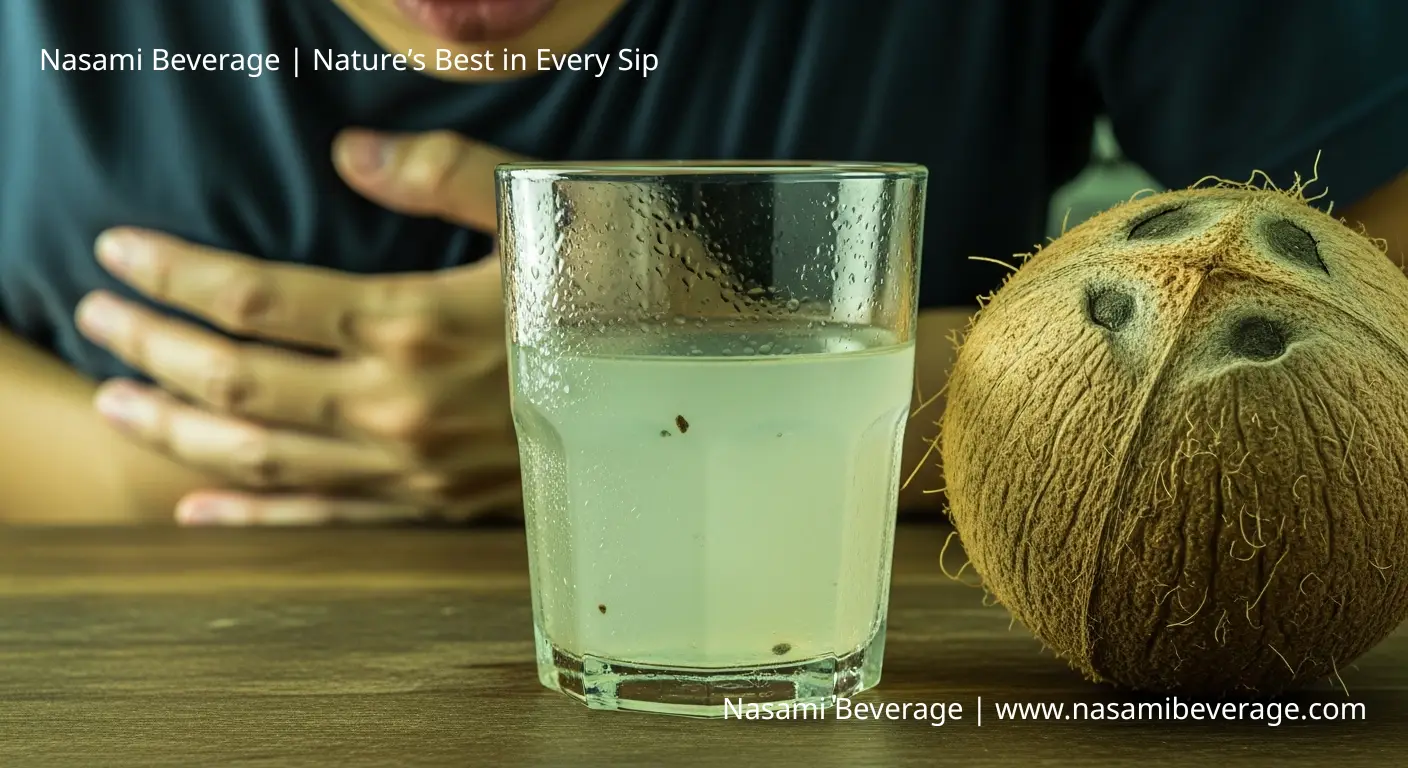Does coconut water help with hydration? Water is the driving force of all nature, as Leonardo da Vinci once said, and staying hydrated is essential for health and vitality. Coconut water has emerged as a popular natural beverage, celebrated for its potential to hydrate effectively. This article explores whether coconut water truly aids hydration, diving into its composition, scientific backing, and how it compares to other drinks. From post-workout recovery to daily wellness, discover the benefits, practical uses, and considerations of incorporating coconut water into your routine, along with tips for choosing the best brands.
What is coconut water?
Origins and composition
Coconut water is the clear liquid found inside young green coconuts, harvested before the fruit fully matures. Packed with natural electrolytes like potassium, sodium, and magnesium, it serves as a hydrating powerhouse. Unlike coconut milk, which is richer and creamier, coconut water is low in calories and fat, making it a refreshing choice for health-conscious individuals.
Its nutrient profile, including small amounts of vitamins and antioxidants, supports its reputation as a natural hydration source. Curious about what colour is coconut water? It’s typically clear but can vary slightly depending on the coconut’s maturity.
Why it’s popular
Coconut water has gained traction among fitness enthusiasts, wellness advocates, and those seeking alternatives to sugary beverages. Its rise in popularity stems from its natural appeal, offering hydration without artificial additives. Brands like Vita Coco and Harmless Harvest have capitalized on this trend, marketing it as a pure, organic option.
Social media and celebrity endorsements have further amplified its status, positioning coconut water as a go-to drink for active lifestyles and tropical-inspired wellness.
Does coconut water help with hydration?
The science behind hydration
Hydration is the process of maintaining fluid balance in the body, crucial for regulating temperature, supporting digestion, and ensuring organ function. Electrolytes, such as potassium and sodium, play a vital role in this process by helping cells absorb and retain water.
Coconut water’s electrolyte content mirrors the body’s natural needs, making it an effective option for replenishing fluids lost through sweat or daily activity.
Evidence supporting coconut water
Research highlights coconut water’s hydration potential, particularly in tropical regions where it has long been used to combat dehydration. A study published in the Journal of the International Society of Sports Nutrition found that coconut water rehydrates as effectively as traditional sports drinks after moderate exercise.
Its high potassium content aids muscle function, while natural sugars provide a quick energy boost. These findings position coconut water as a viable choice for both casual hydration and athletic recovery.
Coconut water vs. other hydration drinks
Coconut water vs. plain water
Plain water is the gold standard for daily hydration, offering zero calories and universal accessibility. However, coconut water provides an edge during intense physical activity or hot weather due to its electrolyte content. While water suffices for routine needs, coconut water excels in scenarios requiring rapid rehydration, such as after a workout or in humid climates.
Choosing between the two depends on activity level and personal preference.

Coconut water vs. sports drinks
Sports drinks like Gatorade are formulated with synthetic electrolytes and sugars to fuel athletes, but they often contain artificial flavors and colors. Coconut water, by contrast, delivers natural electrolytes without additives, appealing to those prioritizing clean ingredients.
A comparison reveals that coconut water has less sodium but more potassium than most sports drinks, making it ideal for moderate exercise. For prolonged, high-intensity activities, sports drinks may still have an advantage due to their higher carbohydrate content.
Additional benefits of coconut water
Post-Workout recovery
Coconut water shines as a post-workout drink, helping replenish electrolytes lost through sweat. Its potassium content supports muscle recovery, reducing cramps and fatigue. Fitness enthusiasts often choose it over sugary alternatives, as it provides hydration and a mild energy boost without spiking blood sugar.
Incorporating coconut water into a recovery routine can enhance performance and comfort, especially after cardio or strength training.
Other health perks
Beyond hydration, coconut water offers digestive support thanks to its fiber-like compounds, which promote gut health. Its antioxidants may combat oxidative stress, while its low-calorie profile suits weight-conscious diets. Some studies suggest it could aid heart health by regulating blood pressure, though more research is needed.
These secondary benefits make coconut water a versatile addition to a balanced wellness plan. For a tasty twist, try smoothie recipes using coconut water to blend hydration with flavor.
How to incorporate coconut water into your routine
Best times to drink it
Coconut water fits seamlessly into various scenarios. Drink it post-workout to restore electrolytes, in the morning to kickstart hydration, or during hot weather to stay refreshed. A serving of 8-12 ounces daily is generally sufficient for most people, though athletes may consume more during training.
Its light, refreshing taste also makes it a great base for smoothies or a standalone beverage on the go.

Choosing the right coconut water
Not all coconut water is created equal. Opt for pure, unsweetened varieties from trusted brands like Zico, C2O, or Taste Nirvana to ensure quality. Check labels for added sugars or artificial flavors, which can diminish health benefits. Organic, raw options like Harmless Harvest prioritize minimal processing, preserving nutrients.
Store coconut water in a cool place and consume it within a few days of opening for optimal freshness. Wondering how to know if coconut water is bad? Look for off smells or cloudiness to ensure quality.
Potential downsides to consider
Calorie and sugar content
While coconut water is naturally low in calories, some brands add sugars or fruit juices, increasing calorie content. A typical 8-ounce serving contains 40-60 calories, which can add up if consumed in large quantities. For those monitoring calorie intake, sticking to unsweetened varieties and moderating portion sizes is key.
Reading labels carefully helps avoid hidden sugars that could undermine dietary goals.

Not a cure-all
Coconut water is a valuable hydration tool but not a one-size-fits-all solution. It cannot replace a balanced diet or address severe dehydration, which may require medical intervention. Individuals with kidney issues or allergies to coconuts should consult a doctor before consuming it.
Viewing coconut water as a complement to water and other healthy habits ensures realistic expectations and safe use.
FAQs – Does coconut water help with hydration?
Is coconut water better than water for hydration?
Coconut water offers electrolytes that plain water lacks, making it superior for rehydration after exercise or in hot conditions. For everyday hydration, water remains sufficient and more cost-effective.
Can coconut water replace sports drinks after exercise?
For moderate workouts, coconut water’s natural electrolytes make it a solid alternative to sports drinks. However, for intense, prolonged activities, sports drinks may provide more carbohydrates for energy.
How much coconut water should I drink daily?
A serving of 8–12 ounces daily is ideal for most people. Athletes or those in hot climates may consume more, but moderation prevents excess calorie intake.
Are there any side effects of drinking coconut water?
Coconut water is generally safe but may cause digestive discomfort in large amounts. Those with coconut allergies or kidney conditions should seek medical advice.
Coconut water stands out as a natural, electrolyte-rich beverage that supports hydration, particularly for active individuals and wellness enthusiasts. Its benefits extend beyond fluid balance, aiding post-workout recovery and offering subtle health perks. By choosing pure, high-quality brands like those offered by Nasami Beverage, you can enjoy its refreshing advantages.
Explore top coconut water options today and elevate your hydration game with nature’s finest drink. Subscribe for more health insights to keep your wellness journey thriving.


